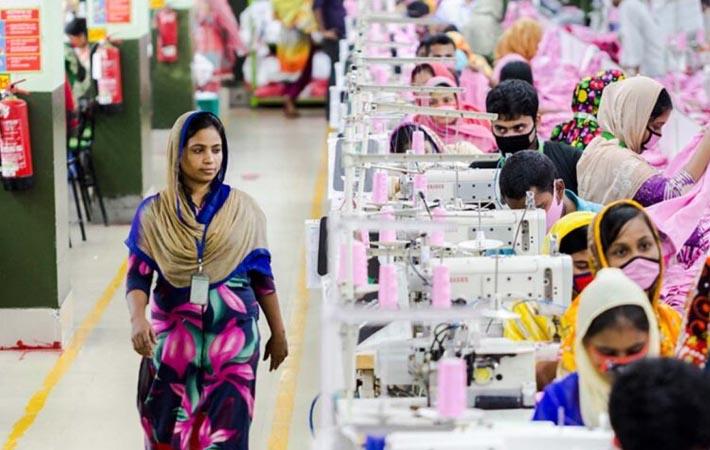Interviews
GFA launches Circular Fashion Partnership in Bangladesh
02 Dec '20
2 min read

Pic: Global Fashion Agenda
Denmark-based sustainability forum Global Fashion Agenda (GFA) recently launched the one-year Circular Fashion Partnership, a cross-sectoral project aimed at supporting the development of the recycling industry in Bangladesh by converting post-production fashion waste into new fashion products and seeking solutions for COVID19-related build-up of deadstock.
The partnership involves P4G, a network of global leaders and innovators seeking breakthrough solutions for green economic growth, project partner Reverse Resources, the Bangladesh Garments Manufacturers and Exporters Association (BGMEA), and textile and garment manufacturers, recyclers and major fashion brands operating in Bangladesh, according to a GFA press release.
New data from Reverse Resources shows that Bangladesh typically features very large factories, with the vast majority being ‘cut make trim’ (CMT) units. The country is a major producer of 100 per cent cotton and cotton-rich fabrics and garments, which is a more waste-intensive fibre than synthetics.
Bangladesh is one of the biggest countries for deadstock volumes, ranked second in average deadstock volume per country within the Reverse Resources database, with an estimated average deadstock wastage rate of 4.5 per cent. The very large majority of deadstock is currently sold to a trader or waste handler for about a third of its original material price.
Reverse Resources concludes that as a result, Bangladeshi facilities report some of the highest average waste volumes globally. Because of the specialism in cotton and cotton rich textiles and large volumes per colour, Bangladeshi factories typically produce very high value waste, ideal for existing recycling technologies.
And as a bitter effect, that textile waste is very often dealt within an informal market (mafia) through a multi-layered system of traders and buyers through which prices are inflated, there is no traceability and contamination is impossible to control, the press release said.
Bangladesh is the largest exporter of textile waste globally, the majority of which is now exported to India for recycling, which shows its value. A value that can be kept in Bangladesh if it is recycled and by doing so, instilling sustainable practices for an industry that is a powerful engine for economic growth and opportunity for many Bangladeshis. It is still possible for a brand, manufacturer or recycling solution provider to join the Circular Fashion Partnership.
The partnership involves P4G, a network of global leaders and innovators seeking breakthrough solutions for green economic growth, project partner Reverse Resources, the Bangladesh Garments Manufacturers and Exporters Association (BGMEA), and textile and garment manufacturers, recyclers and major fashion brands operating in Bangladesh, according to a GFA press release.
New data from Reverse Resources shows that Bangladesh typically features very large factories, with the vast majority being ‘cut make trim’ (CMT) units. The country is a major producer of 100 per cent cotton and cotton-rich fabrics and garments, which is a more waste-intensive fibre than synthetics.
Bangladesh is one of the biggest countries for deadstock volumes, ranked second in average deadstock volume per country within the Reverse Resources database, with an estimated average deadstock wastage rate of 4.5 per cent. The very large majority of deadstock is currently sold to a trader or waste handler for about a third of its original material price.
Reverse Resources concludes that as a result, Bangladeshi facilities report some of the highest average waste volumes globally. Because of the specialism in cotton and cotton rich textiles and large volumes per colour, Bangladeshi factories typically produce very high value waste, ideal for existing recycling technologies.
And as a bitter effect, that textile waste is very often dealt within an informal market (mafia) through a multi-layered system of traders and buyers through which prices are inflated, there is no traceability and contamination is impossible to control, the press release said.
Bangladesh is the largest exporter of textile waste globally, the majority of which is now exported to India for recycling, which shows its value. A value that can be kept in Bangladesh if it is recycled and by doing so, instilling sustainable practices for an industry that is a powerful engine for economic growth and opportunity for many Bangladeshis. It is still possible for a brand, manufacturer or recycling solution provider to join the Circular Fashion Partnership.
Fibre2Fashion News Desk (DS)
Popular News
Leave your Comments
Editor’s Pick
































-Ltd..jpg?tr=w-120,h-60,c-at_max,cm-pad_resize,bg-ffffff)





.jpg?tr=w-120,h-60,c-at_max,cm-pad_resize,bg-ffffff)
.jpg?tr=w-120,h-60,c-at_max,cm-pad_resize,bg-ffffff)






